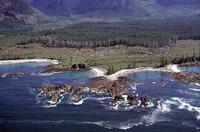Clayoquot Sound
CLAYOQUOT SOUND () on the west coast of VANCOUVER ISLAND extends from ESTEVAN POINT on the HESQUIAT Peninsula in the north to PACIFIC RIM NATIONAL PARK in the south. It encompasses 9 major watersheds, several large islands—including FLORES, VARGAS and MEARES—and 2,440 sq km of lush rain forest nurtured by dense fogs and heavy annual precipitation. It is considered one of the most spectacular wilderness areas on the continent. Most of it is accessible only by water. People of the Tla-o-qui-aht First Nation (NUU-CHAH-NULTH), after whom the sound is named, have occupied the area for many generations. TOFINO is the commercial and TOURISM centre of the sound. There are HOT SPRINGS at HOT SPRINGS COVE and AHOUSAT.
Clayoquot Sound encompasses one of the largest tracts of temperate rain forest remaining in N America. Intensive LOGGING occurred from early in the 1900s; about a quarter of the forest had been logged by the late 1990s. In the mid-1980s the area became the focus of a protracted dispute between loggers and environmentalists. In April 1993 the provincial government released a compromise land use plan that permitted controlled logging in parts of the sound. Many environmentalists did not accept the compromise; that summer logging roads were blocked in a protest that resulted in the largest mass arrest in Canadian history to that time. More than 900 people were arrested for violating an injunction banning the blockade and 857 were charged with contempt of court. Some received suspended sentences; others were fined and jailed. In March of the following year, the Nuu-chah-nulth signed a resource management agreement with the government that gave them a role in the economic development of the sound. Numerous solutions were suggested to resolve the situation, including the Clayoquot Biosphere Reserve under the UN's Man and Biosphere Program, and the Central Region Board, a unique government–Nuu-chah-nulth body under which a development corporation, Ma-Mook, was established to undertake agreements with large forest companies. As well, in 1995 the government announced strict guidelines for logging companies operating in the watershed. By 2007 major lumber companies had pulled out of Clayoquot and almost all logging in the Sound was being done by the area's First Nations. See also ENVIRONMENTAL MOVEMENT; FOREST INDUSTRY; PARKS, PROVINCIAL.

